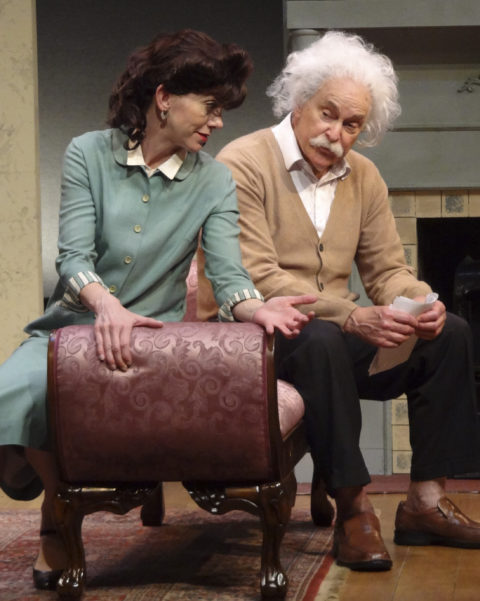
Mark St. Germain tackles a lot of thought-provoking and entertaining ideas in the stimulating world premiere of “Relativity” at Florida Studio Theatre, which commissioned this play about the public and private sides of Albert Einstein.
He contrasts Einstein the brilliant physicist against the private man who was so focused on his research that he detached himself from his family and the world (except for publicity purposes). He is presented as the stereotypical absent-minded professor, who may have discovered the theory of relativity but can’t remember his home address.
More importantly, it offers a sometimes fascinating (occasionally overstuffed) debate about whether you can be a great man without being a good man. You might do important things that help advance our understanding of the universe , but is it meaningless without a sense of humanity, love and compassion for those closest to you?
These are weighty issues for an 80-minute play without intermission, but St. Germain builds on them with both seriousness and a good amount of humor to make them relatable (aside from a brief discussion about some scientific theories that lost me).

Robert Zukerman as Albert Einstein in the world premiere of Mark St. Germain’s play “Relativity” at Florida Studio Theatre. PHOTO PROVIDED BY FST
All these ideas emerge from the play’s focus on Einstein’s personal life and what may have happened to the daughter, Leiserl, he had with his first wife, Mileva, before they were married. Apparently, there was no mention of the girl after she was about 2 years old. Did she die of scarlet fever? Was she given away by a family friend because the young couple couldn’t afford to raise her? Could she be the woman now interviewing him for a newspaper article for the Jewish Daily in his Princeton University office in 1948?
There has been speculation about what happened to Leiserl, and St. Germain offers his own possibilities about the woman she might have become, the events in her life and how they keep tying back to her famous father. The questions begin as Margaret Harding interviews him in a personal way about his two sons (from whom he is estranged), an old family friend and about Mileva. She wants to know what happened to Leiserl….
While there are a few exchanges that sound a bit formal compared to the rest, the play zips along and leaves you with plenty to think and talk about and perhaps eager to look anew at the life and work of Einstein.
Read the full article from the Sarasota Herald-Tribune here.